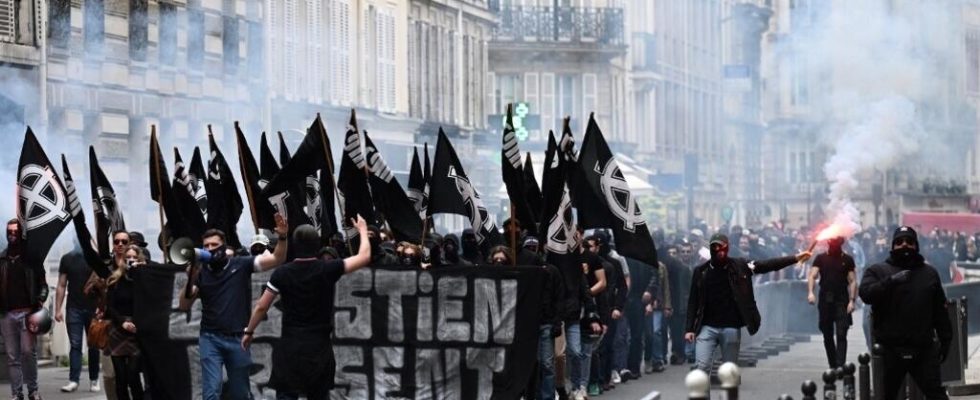After an authorized parade of several hundred activists on Saturday May 6 which aroused strong criticism on the left and which Prime Minister Elisabeth Borne herself deemed “shocking”, the government will now ban all ultra-right demonstrations.
Four days after the demonstration of 600 ultra-right activists and the controversy that followed, the government finally decided to crack down. In front of the deputies, the Minister of the Interior Gérald Darmanin announced that he had ” given as instructions to the prefects » to issue prohibition orders when far-right or ultra-right activists or collectives file declarations of demonstrations. ” We will let the courts judge whether case law will allow these demonstrations to be held. “, he added.
While the “casserolades” against the pension reform are regularly prohibited by the prefects, the left has been indignant for two days that these hundreds of ultra-right activists from the May 9 Committee, the majority of whom had their faces concealed, have able to demonstrate on Saturday in Paris. These demonstrators who wanted to mark the 29th anniversary of the death of a far-right activist, Sébastien Deyzieu, who died accidentally in 1994, exhibited black flags marked with the Celtic cross and chanted, at the end of the rally, “Europe jeunesse Révolution “, the slogan of the GUD (Defence Union Group).
► To listen also: Emmanuel Macron: 100 days and many pans
A little earlier this Tuesday, during a press conference in Matignon, Elisabeth Borne said to herself “ shocked ” by the images of this demonstration, but she recalled that there was ” no pattern to prohibit it, taking up the arguments of the Paris police headquarters (see box). ” There is a right to demonstrate that is guaranteed and we can only go back on this right when there are good reasons. “, For example ” risk of public order disturbances “, argued the head of government. ” It turns out that there was no risk identified “, she continued, explaining that this demonstration had already taken place in the past years without disturbing public order.
” Two weights, two measures “
But the left violently denounced this demonstration, accusing the government of a “double standard”. In the morning, the president of the group La France insoumise Mathilde Panot thus regretted the “ total silence ” of the government on this demonstration of ” neo-nazis “, accusing the executive of” let the far right thrive “. His rebellious colleague, MP Aurélie Trouveau, more broadly underlined the ” relative impunity ” of these groups, citing the case of several people ” seriously attacked ” North Station ” 10 days ago ” by ” neo-nazis “, including his parliamentary attaché, who had several days of interruption of working time.
” It is not because the enemy is silent and that he marches in step without overflowing that he is not dangerous “, argued the ecologist deputy Francesca Pasquini in the hemicycle. She also pointed out that ex-treasurers of Marine Le Pen’s micro-party had participated in the parade. But the patroness of the deputies of the National Rally defended herself on Tuesday to be “ close of these people, and recalled that it is forbidden to parade masked: ” These provocations cannot be tolerated “, she said.
According to Mediapart, the ultra-right demonstration on Saturday ended with a concert of “Aryan rock” in Saint-Cyr-l’École (Yvelines), in a room called Simone Veil, the former Minister of Justice, survivor of the Holocaust. The organizers had pretended to want to celebrate a ” anniversary “, according to the town hall, which indicated to Agence France-Presse that it would send a report to the public prosecutor of Versailles.
A right guaranteed by the Declaration of 1789
The right to demonstrate is not enshrined in the Constitution, but it is guaranteed by Article 10 of the Declaration of the Rights of Man and of the Citizen of 1789 and Article 11 of the European Convention on Human Rights. male. The first states that ” no one should be disturbed for his opinions, even religious ones, provided that their manifestation does not disturb the public order established by law “. The second that “ everyone has the right to freedom of expression. This right includes freedom of opinion and the freedom to receive or impart information or ideas without interference by public authorities and regardless of frontiers. “. Consequently, a demonstration cannot be banned on the grounds of a particular political orientation.
If a demonstration has been duly declared, in order to issue a prohibition order, it is necessary to meet ” two conditions “, according to the article of the decree-law of 1935. It is necessary ” a real danger of serious disorders ” And “ the lack of any other effective means of maintaining public order “.
(With AFP)
